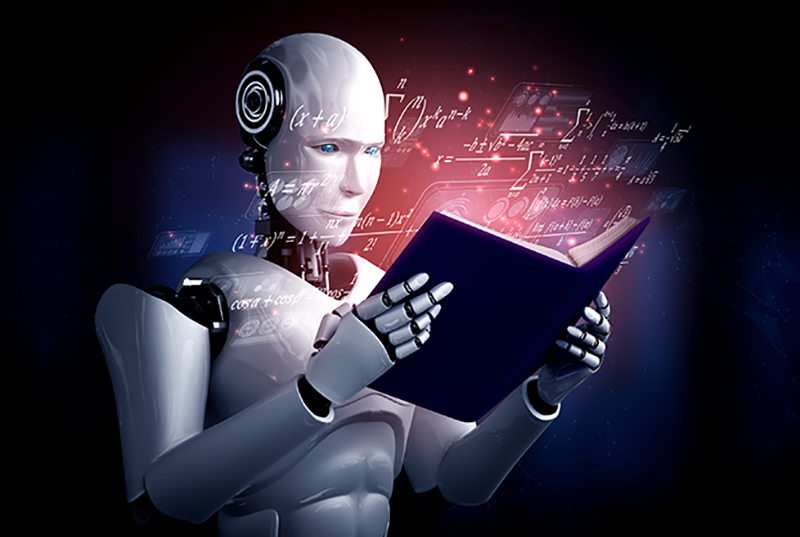The advent of machine learning (ML) and artificial intelligence (AI) has ushered in significant growth and changes in different fields. When it comes to the education and learning sector, the introduction of AI with today’s digital learning system has brought a whole new concept of learning into the industry vertical. AI can be used to automate systems for better efficiency, enhanced speed, and precision.
With AI applications, many processes in the education field have become simpler and faster. Reports suggest that the AI education market is predicted to cross 20 billion USD by 2027. Ranging from mobile digital courses to online references and virtual classrooms, AI in education has revolutionized the conventional methods of learning. An artificial intelligence outsourcing company can help educational institutions incorporate the latest technologies into their day-to-day operations – involving both learning and teaching thereby simultaneously benefiting both the students and teachers.
Even though AI-powered technologies have been around for a while in education, the sector has been quite lethargic in their acceptance. However, the pandemic completely transformed the situation, forcing educators to depend more on technology for virtual instruction. As per reports, more than 50 percent of schools and universities rely on AI for administrative assistance, with a rising emphasis on improved higher education quality. It is estimated that about 86 percent of educators believe that technology should be an integral element of education. AI has immense potential to improve both learning and teaching.
How Is AI Benefiting and Transforming Education and Learning?
AI enhances the personalization of student learning programs and courses. It promotes tutoring by helping students improve their weaknesses and sharpen their skills. The technology also ensures quick responses between teachers and students, and enhances universal 24/7 learning access. In addition, educators can use AI for task automation, including administrative work, evaluating learning patterns, grading papers, responding to general queries, and more.
Here are some of the top ways AI is benefitting the education and learning industry :
-
- Personalized Learning – Personalization has become a significant trend in the education industry. Generally, students learn in their own individual ways. For instance, some students grasp new concepts quickly, whereas others require more time. The conventional learning system lacked the concept of customized learning for each unique student. AI ensures that the educational software is personalized for each student. The technology offers students a customized learning approach depending on their individual preferences and experiences. It can adjust to each student’s knowledge level, desired goals, and learning speed to help get the most out of their learning. Furthermore, with supporting technologies such as Machine learning in education, the system backs up how the student perceives various lessons, identifies their areas of weakness and adapts to that student’s needs.
-
- Tutoring Support – Intelligent tutoring systems, including AI chatbots and tutors, and tutoring programs are designed to handle customized feedback and guidelines for one-on-one teaching. However, these chatbots can’t fully replace teachers. AI programs can assist students in improving their skills or weak areas outside the classroom. They offer one-on-one experiential learning without the need for a teacher to be available to answer questions at all hours of the day. In addition, an AI-powered bot can respond to queries within seconds.
-
- Automation Tasks – Generally, teachers have a lot to manage, including classes and other administrative and organizational tasks. AI helps automate the most basic tasks like – replacing administrative labor, grading papers, measuring learning patterns, responding to general questions, etc. Automation tools and solutions can help educators automate manual processes by giving them more time to concentrate on teaching key competencies.
-
- Universal 24/7 Access – AI-powered solutions make learning available to all students, at any time and from any location. As each learner has his or her own pace, having 24/7 access allows kids to experiment with what works best for them without having to wait for an educator. Through AI tools, classrooms are now globally available to students, including those with visual or hearing impairment or who use different languages.
-
- Creating Courses – Creating learning courses via a central department can be a costly and time-consuming process. AI simplifies and accelerates course development. AI systems can help streamline the course creation process and reduce costs. AI software for creating courses can help create interactive content flawlessly. With this tool, you can efficiently work with the entire team via in-app comments from reviewers and co-authors to create perfect training material. By assessing student learning history and abilities, AI can give educators a clear picture of the lessons and subjects requiring reevaluation. Educators can modify their courses by evaluating each student’s specific needs to address common knowledge gaps. This enables them to develop the best learning programs for all the students.
- Smart Content Creation – Artificial intelligence and machine learning technologies can help teachers and research experts create innovative and smart content for convenient learning. Smart content may include digital guides, textbooks, videos, and instructional snippets. AI can develop customized environments for learning organizations depending on their specific strategies.
Here are a few examples of AI smart content creation:
-
- Information visualization – AI smart content creation stimulates the real-life experience of visualized web-based study environments. The technology helps with 2D-3D visualization, where students can identify information in more than one way.
-
- Digital lesson generation – AI in education can help generate bite-size learning through low-storage study materials and other lessons in digital format. This in turn helps students and experts can leverage the entire study material without taking much space in the system. In addition, these materials can be accessed from any device.
- Frequent content updates – AI allows users to create and update the information frequently to keep the lessons up-to-date with time. In addition, the users can also get notified every time new information is added, which helps prepare for upcoming tasks in a better manner.
-
- Customized Data-based Feedback – When it comes to designing learning experiences, (whether in a workplace or classroom), feedback is a crucial aspect. AI in education analyzes and determines work reports based on everyday data. A data-based feedback system helps with student satisfaction, removes bias from learning, and helps understand the core areas where the skills are lacking. This feedback is personalized according to each student’s or employee’s performance recorded in the system.
-
- Online Examination – Regarded as one of the most effective online examination solutions, AI software systems can help detect suspicious behavior and alert the supervisors during the course of examinations and interviews. The AI programs keep track of each individual through web cameras, microphones, and web browsers and perform a keystroke analysis where any movement alerts the system.
- Answering Questions – AI-powered chatbots with accessibility to a school’s entire database can answer a range of generic and repetitive questions that students commonly ask. With such chatbots, there is no need to contact a faculty member. This way, AI frees up time for teachers to concentrate on curriculum design, coursework research, and ways of increasing student engagement.
Adopting Artificial Intelligence (AI) technology in the education sector can be beneficial in a number of ways. Right from chatbots to automation, there is rapid implementation of AI in the education sector and we are yet to see and experience greater AI applications in the future. Investing in the latest AI technologies can help businesses gain significant operational efficiency and cost-saving benefits.
AI provides a secure solution to ensure the integrity of online test system assessments in a cost-effective manner. The use of AI can reduce or even eliminate the need for physical supervisors/inspectors and make deployment far more scalable. Educational institutions can consider associating with a reliable business process outsourcing company to carry out various academic processes more quickly and efficiently.
Managed Outsource Solutions (MOS)’ provides state-of-the-art AI solutions to address your unique business needs.




